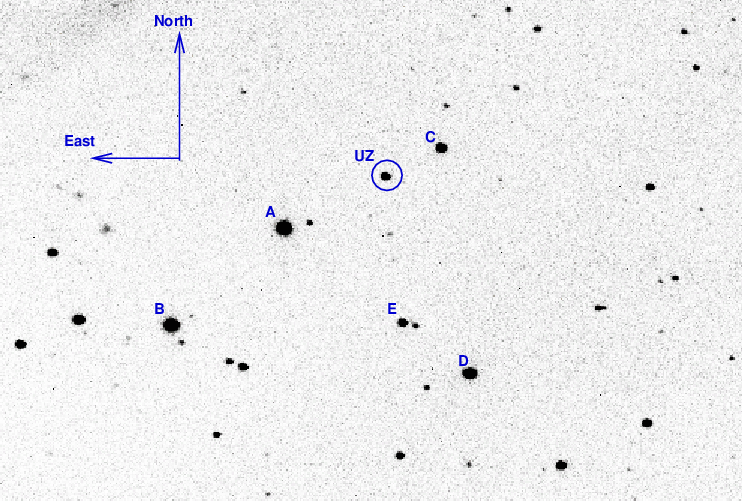
On the night of Aug 10/11, 2013, I observed UZ Boo and SN 2013ej in M74. Conditions were pretty good, and I caught UZ Boo in a rapid re-brightening phase!
The main setup was:
Notes from the night
I took a long series of images of UZ Boo, using much longer exposure times (150 seconds vs. 30 seconds) in order to improve the signal-to-noise ratio; after all, UZ Boo was pretty darn faint last night. But it turned out that the star entered a rapid brightening phase and so was about two magnitudes brighter than it had been 24 hours earlier.

There were some clouds early in the observing run, but they soon left and the skies were very clear.
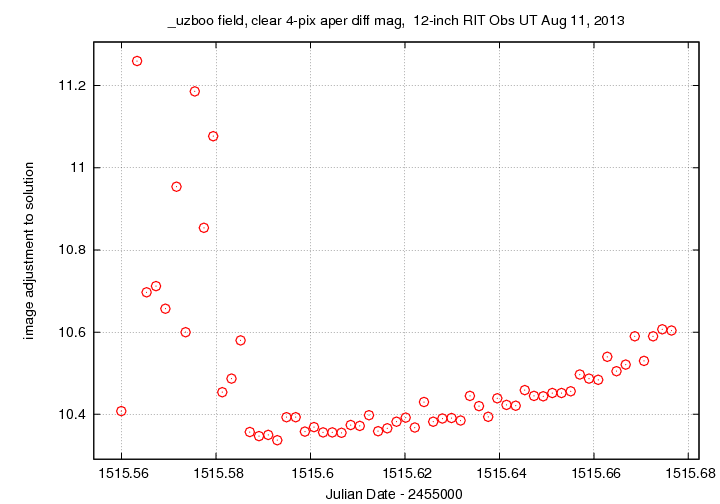
I measured UZ Boo and many other stars in the field. The bright stars "A", "B" and "D" were somewhat saturated, so I left them out of the ensemble solution. Instead of the star "A", I used the star "E" = UCAC4 561-055129 = AAVSO 000-BBV-649 to shift the instrumental magnitudes to the standard scale. Remember, the measurements are made without a filter , but I'll shift them to match the V-band scale: 000-BBV-649 has mag V = 14.267 according to the AAVSO chart 12447AMF.
Below are light curves for UZ Boo and several of the unsaturated stars in the field:
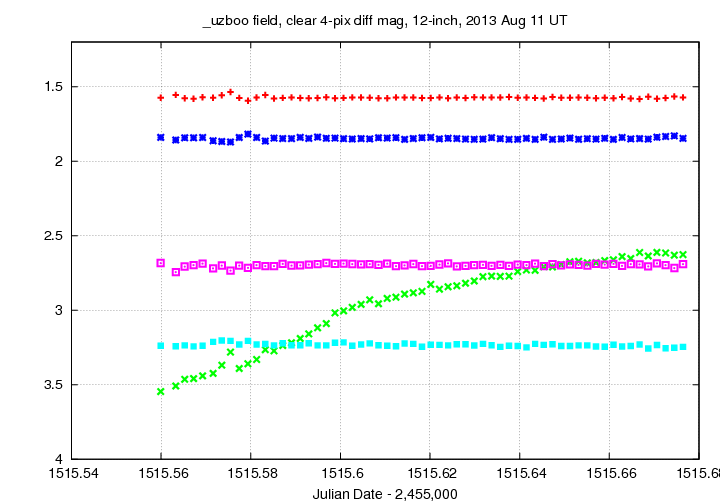
Below are the first few lines of the report I've sent to the AAVSO and VSNet.
# Measurements of UZ_Boo made at RIT Obs, Aug 11, 2013 UT, # in good conditions, # by Michael Richmond, using 12-inch Meade and SBIG ST-8E CCD. # Exposures 150 seconds long, clear filter. # Tabulated times are midexposure (FITS header time - half exposure length) # and accurate only to +/- 1 second (??). # 'mag' is a differential magnitude based on ensemble photometry # using a circular aperture of radius 7.4 arcseconds. # which has been shifted so UCAC4 561-055129 has mag=14.267 # which is its V-band magnitude according to AAVSO. # # UT_day JD HJD mag uncert Aug11.05993 2456515.55993 2456515.55846 15.130 0.014 Aug11.06328 2456515.56328 2456515.56181 15.093 0.015 Aug11.06528 2456515.56528 2456515.56381 15.048 0.014
SN 2013ej is a Type II supernova in the relatively nearby galaxy M74. It was discovered by the KAIT group some time (a week?) before maximum light. Here's a chart showing the galaxy, the SN, and some reference stars:
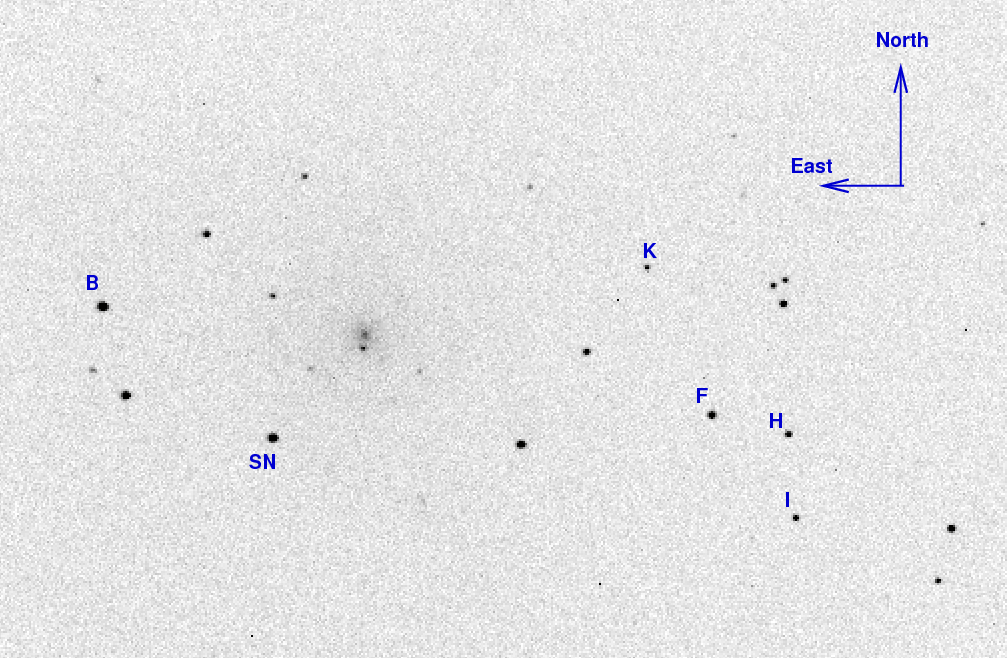
The reference stars marked above have magnitudes in AAVSO chart 12459CA, as follows:
letter B sigB V sigV R sigR I sigI B 13.012 0.019 12.510 0.019 12.154 0.019 11.834 0.019 F 13.848 0.026 13.065 0.022 12.622 0.025 12.152 0.027 H 14.338 0.029 13.692 0.024 13.329 0.029 12.964 0.030 I 14.832 0.027 13.912 0.023 13.416 0.026 12.939 0.030 K 15.192 0.034 14.613 0.027 14.275 0.034 13.915 0.036
After discarding the bad images, I was left with 8, 6, 6 and 6 images in B, V, R, and I, respectively.
Using aperture photometry with a radius of 4 pixels (radius of 7.4 arcsec), I measured the instrumental magnitudes of a number of reference stars and the target. Following the procedures outlined by Kent Honeycutt's article on inhomogeneous ensemble photometry, I used all stars available in each image to define a reference frame, and measured each star against this frame. I used the AAVSO magnitudes, plus color terms to convert the ensemble instrumental magnitudes to the standard Johnson-Cousins BVRI scale.
Results from this morning are:
filter mag mag_uncert Julian Date B = 12.973 +/- 0.036 (ens 0.016 zp 0.033) 2456515.70923 V = 12.548 +/- 0.013 (ens 0.012 zp 0.006) 2456515.70259 R = 12.303 +/- 0.015 (ens 0.008 zp 0.012) 2456515.69579 I = 12.219 +/- 0.030 (ens 0.019 zp 0.024) 2456515.71768
The uncertainties here are roughly equally distributed between extracting the instrumental magnitudes and transforming the instrumental magnitudes to the standard scale.
Grab the text file below for all the RIT measurements of SN 2013ej. All these values have been recomputed with the new color terms of UT 2013 Aug 05.
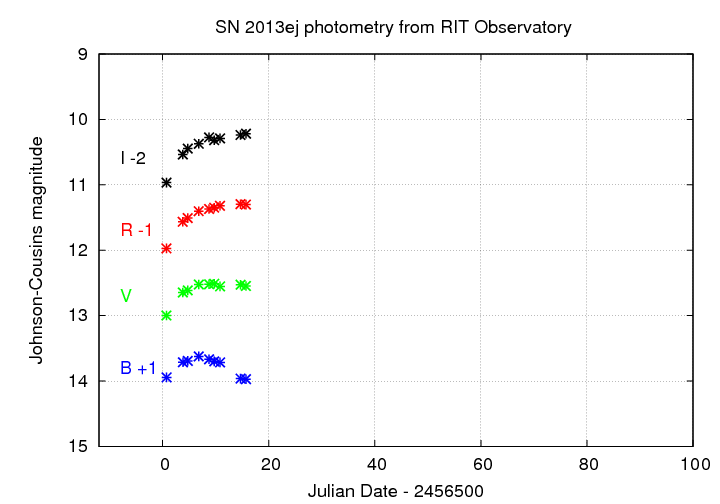
Last modified 08/12/2013 by MWR.